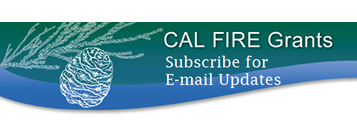Forest Health Grants
Funding active restoration and reforestation activities aimed at providing for more resilient and sustained forests

CAL FIRE’s Forest Health Program funds active restoration and reforestation activities aimed at providing for more resilient and sustained forests to ensure future existence of forests in California while also mitigating climate change, protecting communities from fire risk, strengthening rural economies and improving California’s water & air.
Through grants to regionally-based partners and collaboratives, CAL FIRE seeks to significantly increase fuels management, fire reintroduction, treatment of degraded areas, and conservation of forests.
Draft FY 2025–26 Forest Health Grant Guidelines
The Draft FY 2025–26 Forest Health Grant Guidelines are now available for public review and comment. For this upcoming funding cycle, two grant solicitations will run simultaneously, and separate draft guidelines have been developed for each funding source:
Interested parties are encouraged to review the applicable draft guidelines and submit feedback during the two-week public comment period, which is open through February 24, 2026.
Applicants seeking consideration for both funding sources will be required to submit separate applications for each funding source once the solicitation opens.
Comments received will help inform the final program guidelines prior to the solicitation opening. Please submit all comments by email to ForestHealth@fire.ca.gov no later than February 24, 2026.
Eligible applicants include:
- Local, state, and federal agencies including federal land management agencies;
- Universities;
- Special districts;
- Native American tribes;
- Private forest landowners; and
- Non-profit 501(c)(3) or 501(c)(6) organizations (e.g., fire safe councils, land trusts)
Forest Health projects must further the regulatory goals of the Global Warming Solutions Act of 2006.
Applicants will be required to include a quantitative estimate of the net GHG benefit in terms of metric tonnes of carbon dioxide equivalent (CO2e) per the Forest Health Quantification Methodology (QM) and Calculator Tool. Some activities, such as planning, research, or education, may not have a measurable GHG emissions benefit. In this case, applicants must provide a justifiable qualitative description of how the activity will ultimately result in emissions reductions, further quantitative assessment of GHG impacts, or improve management actions or policy.
Preference is given to projects that have environmental compliance (CEQA, NEPA, etc.) completed before the project application is submitted. Applicants must agree to complete all needed environmental compliance work within one year of award and must demonstrate progress toward completing the work within six months of award.
How to determine if a project is more applicable to the Forest Health or the Wildfire Prevention grant program?
The Forest Health Program is part of California Climate Investments, which uses billions of Cap-and-Invest dollars to fund projects that reduce harmful emissions, protect public health, strengthen local economies, and support natural environments. With a strong focus on communities most impacted by pollution and limited access to resources, California Climate Investments help build a more equitable and sustainable future.
